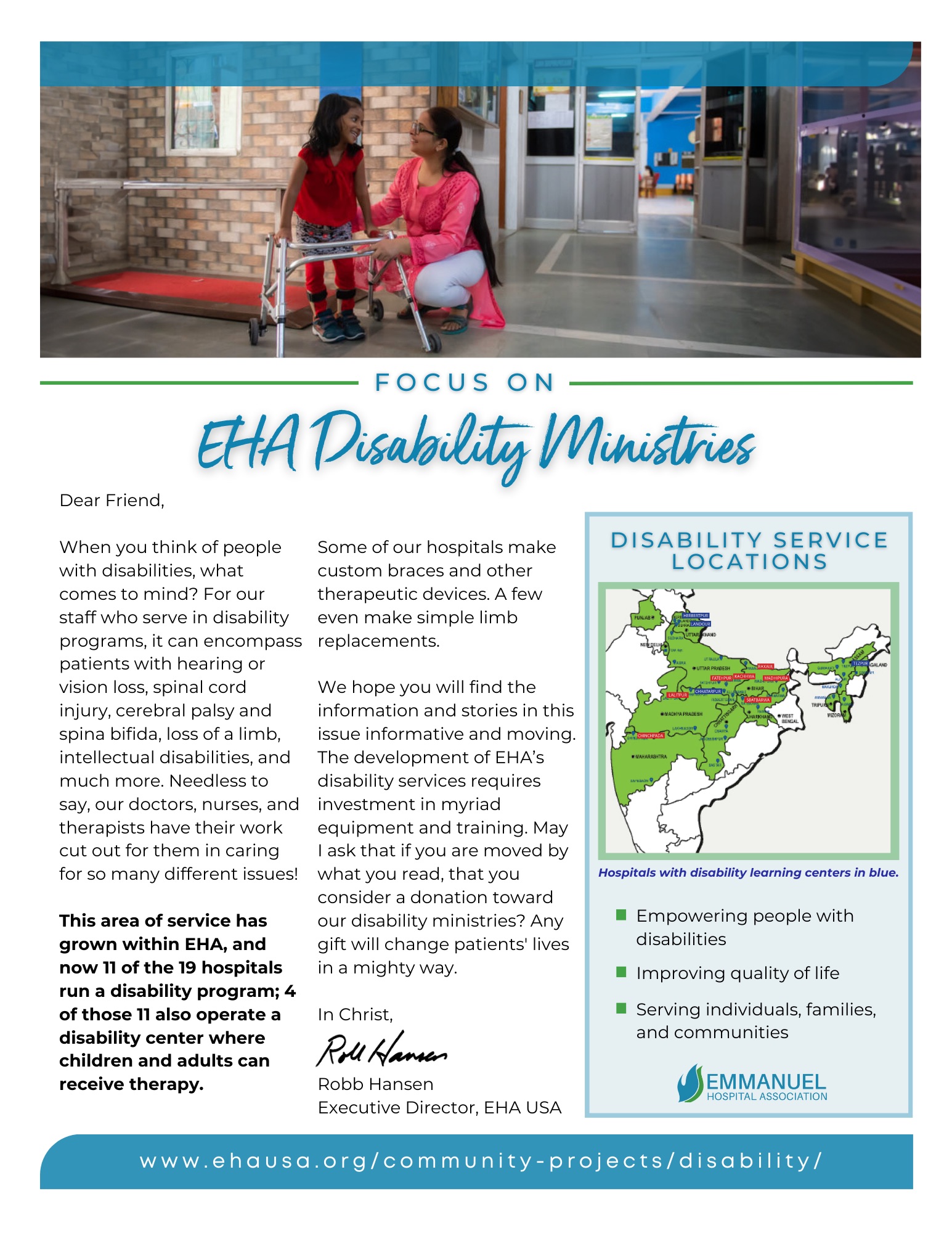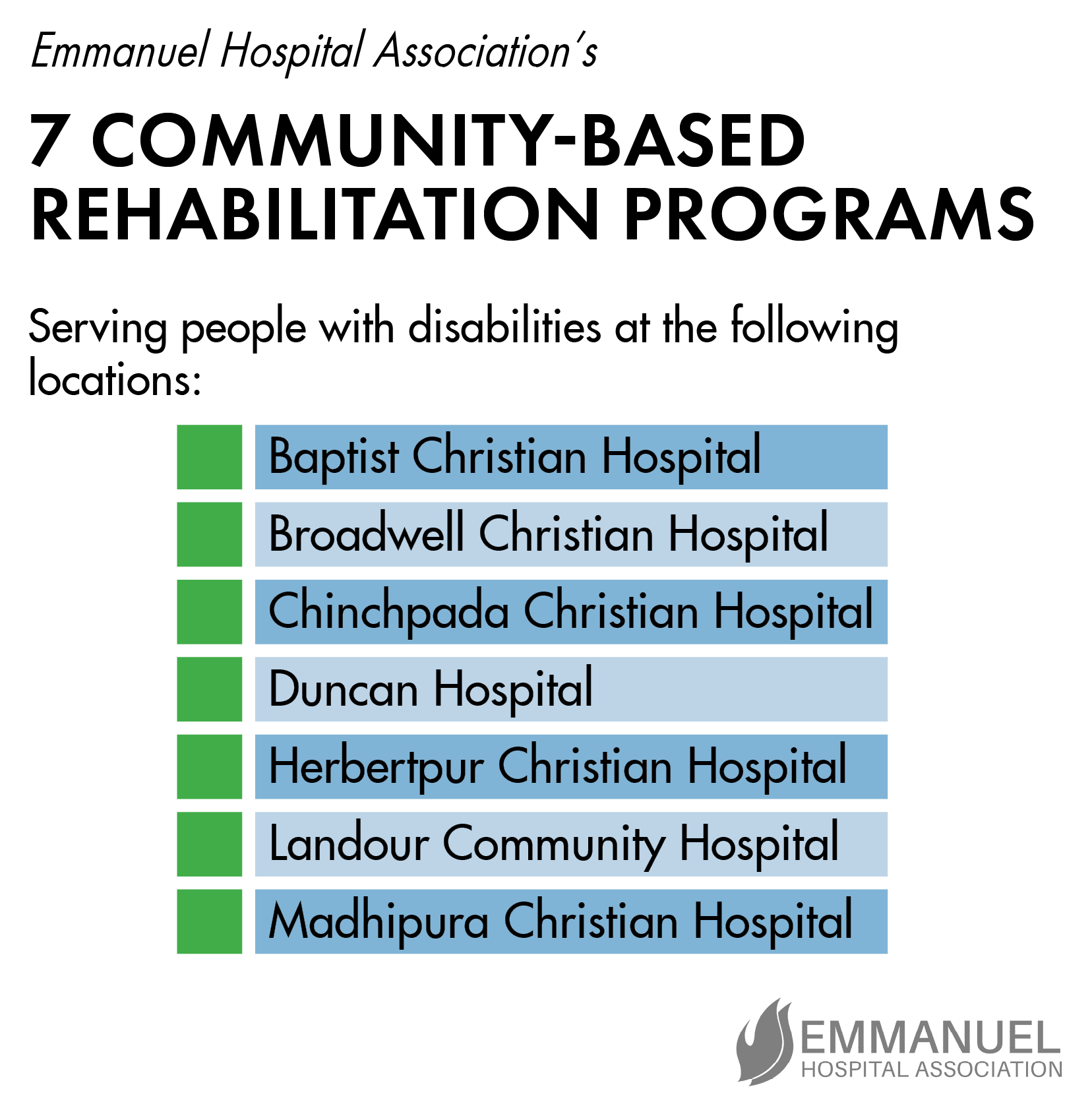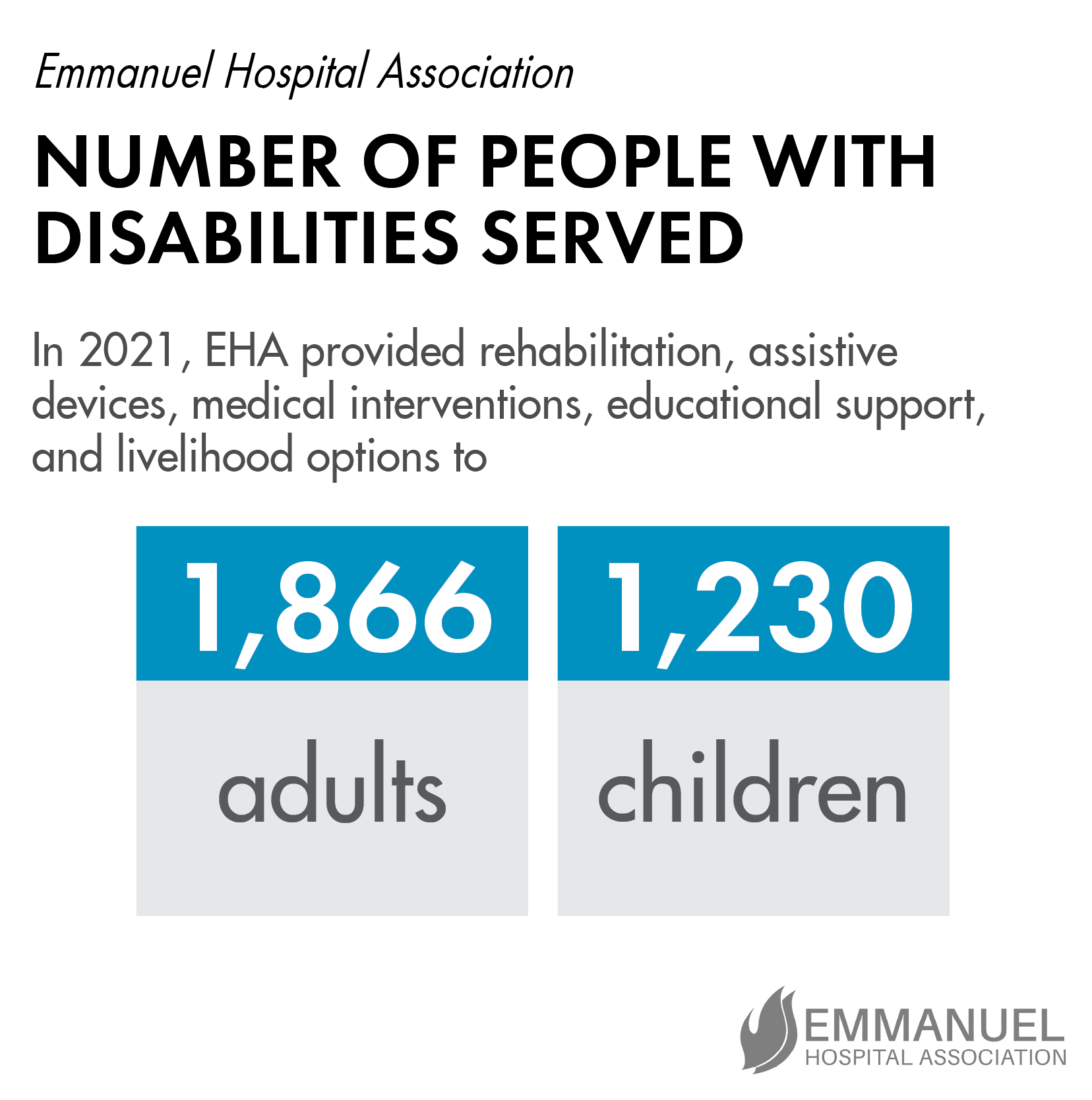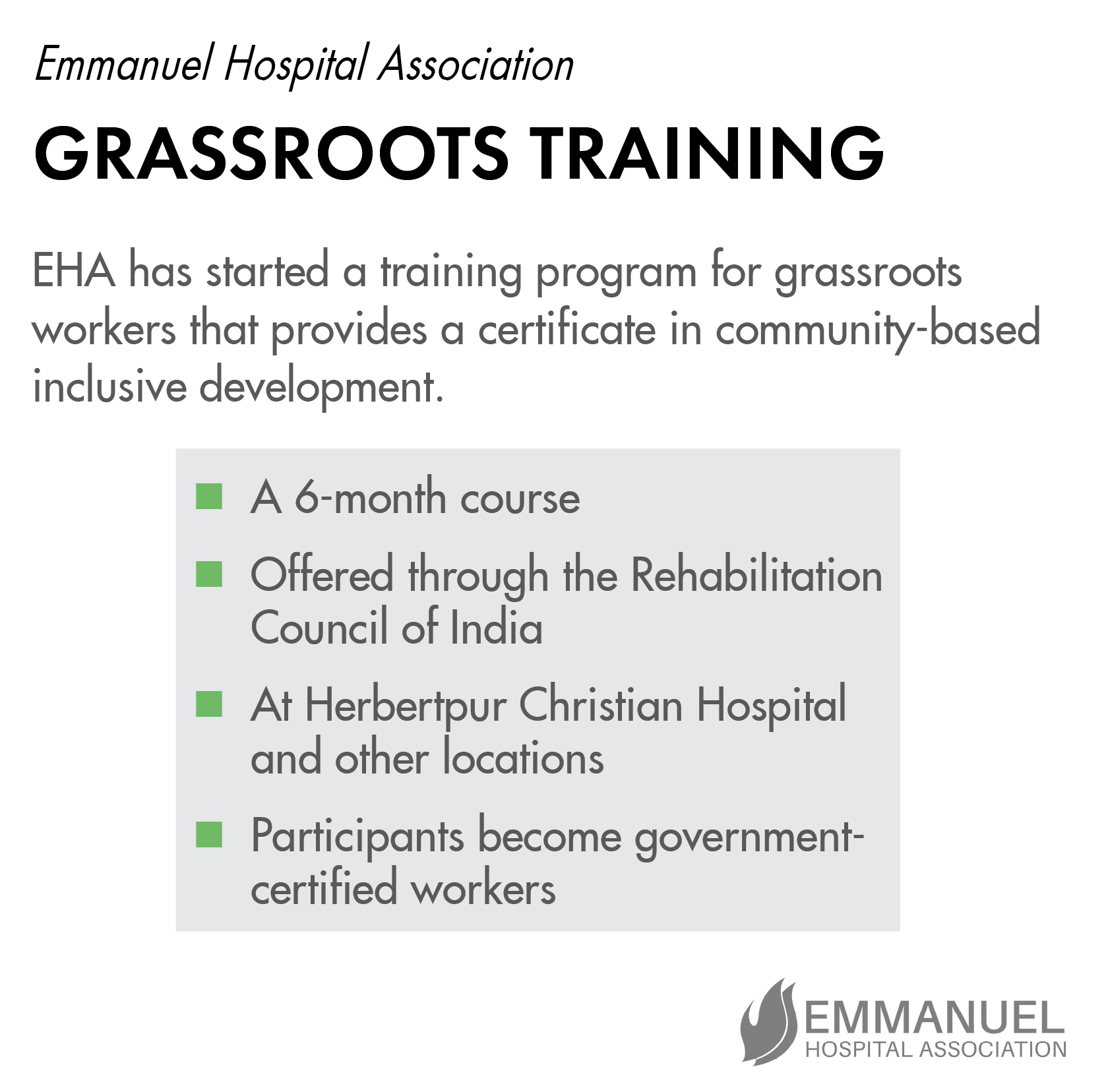Disability
Read all about EHA’s Disability Ministries in this newsletter. Learn how they help patients with hearing or vision loss, spinal cord injury, cerebral palsy and spina bifida, loss of a limb, intellectual disabilities, and much more. Click the newsletter image to read the pdf.
Walking with Joy
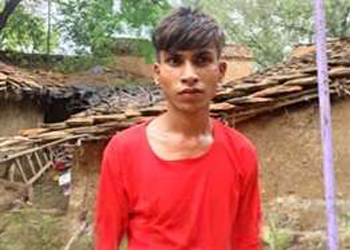
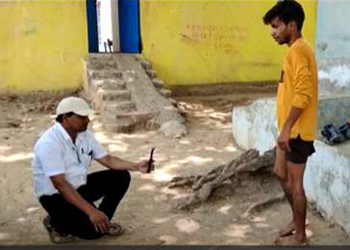
For eighteen years Roshan had been unable to walk. He was born with extremely weak quadriceps that left him immobile and frustrated. As a child, Roshan was taken for treatment using the $600 his parents were able to scrape together, but there was no improvement.
Roshan lived with his widowed mother and six older brothers near Chhatarpur Christian Hospital. He went to school through eighth grade but was unable to participate in normal activities and was often left home alone, his depression deepening.
In May, the Chhatarpur community health team learned about Roshan. They counseled him about self-respect, resilience, and life goals, and they placed him in a Disabled People’s Group (DPG). A physiotherapist gave him mobility exercises to do daily. The staff followed up with him weekly, and he tentatively began to walk.
At the end of June, Roshan surprised his family by dancing at his brother’s wedding. He was thrilled to be a real part of this social gathering and has left his depression behind.
The DPG gives him good support, and the community staff have helped him apply for disability benefits. Roshan’s life opportunities have opened up before him due to the care and simple physical therapy that EHA staff were able to provide for him.
Disability Ministries Transform Lives
Learning to Walk and to Work
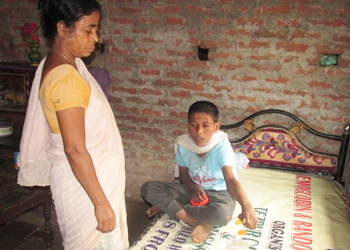
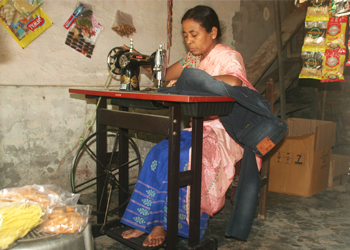
Anjali Borah has had more than her share of difficulties. Her son, Vishal, was born with cerebral palsy along with mild intellectual disabilities. He was unable to walk without assistance due to severe jerkiness in his legs. In 2013, the community based rehabilitation (CBR) workers from Baptist Christian Hospital (BCH) learned of Vishal’s difficulties, and they began to give him therapy. Due to the faithful efforts of the CBR team, Vishal learned not only to walk unassisted, but to run. He is now completely independent for his mobility, which is such a blessing for his mother.
But also in 2013, Anjali’s husband died. The shop that he ran to provide for the family was closed, leaving them with no income. Having had training in sewing, embroidery, and knitting, Anjali wanted to sew for a living, but she couldn’t afford a sewing machine. She struggled to provide for herself and her son. Again, the BCH community staff came to her aid and purchased a sewing machine for her. In addition, they encouraged her to open up the family shop again with financial assistance from Joni and Friends. Now, Anjali has two ways to provide for herself and her son, and she is thrilled to be independent and productive.
Therapy Brings New Life to 10-Year Old Boy

Running around and playing is so much a part of a child’s life that it is often taken for granted, but this can change in the blink of an eye. Ten-year-old Rishi was brought to Madhipura Christian Hospital (MCH), unconscious and gasping. He had been bitten by a snake, and, as is the usual practice, was taken to a local witch doctor. He was given some local potions with the usual incantations, but when he became unconscious, he was brought to MCH.
Rishi was intubated, ventilated, and given antivenom. A few days later, he was extubated, but his sensory levels were low and he had no head control. He was unable to recognize his family members or speak, and he also had a few seizures. Hypoxic brain injury was suspected since he had not been breathing properly for a prolonged period of time. Rishi’s family took him for an MRI at the nearest center 3 hours away in Purnea. When the MRI showed no structural issues, he was sent home with exercises, play-based home stimulation, and a plan for follow-up. Rishi’s family lacked hope, but the MCH staff assured them that his recovery would likely take some time and therapy.
Rishi visited MCH’s outpatient therapy department regularly after that, with his initial sessions focused on improving his upper body control and speech. He was taught skills for daily living, and they worked to improve his balance and cognition. Each small step of progress was celebrated, and it was a joy to see him first sit and then stand, with support. He got to know the team quite well as his memory improved, and he was happy to come for therapy sessions. Over a period of 8 months, Rishi kept improving, a miracle right before the staff’s eyes! His seizures also stopped and he was weaned off antiepileptic medications. Rishi is now able to walk independently and take care of himself. He is also speaking, reading, and writing, just as he did before his illness, and he hopes to return to school as soon as COVID-19 allows.
Life-Giving Therapy for Amputee
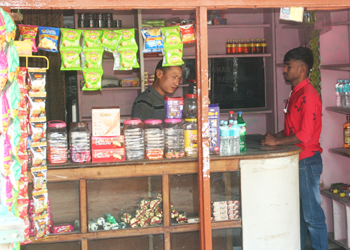
As a young man, Krishna Thappa was working as a laborer in the Seppa region of Arunachal Pradesh when his left foot was injured with a water pipe. His foot became infected, which eventually led to his leg being amputated below the knee. Devastated, Krishna stopped interacting with others. Eventually, the rehabilitation staff at Baptist Christian Hospital (BCH) learned of Krishna’s situation. They took him to Guwahati to have a custom prosthetic leg and foot fabricated for him.
Initially, Krishna was too afraid to stand or walk with his prosthesis. BCH therapists gave him three months of regular therapy and gait training. This enabled him to walk with the prosthesis confidently, and even cycle.
Once his confidence grew, he opened his own shop to support himself. Gradually, his sales flourished, and currently he earns about 30,000 rupees ($400) a month. Krishna is thankful for the rehabilitation sessions he received from EHA therapists who gave him his life back.
A Whole New World
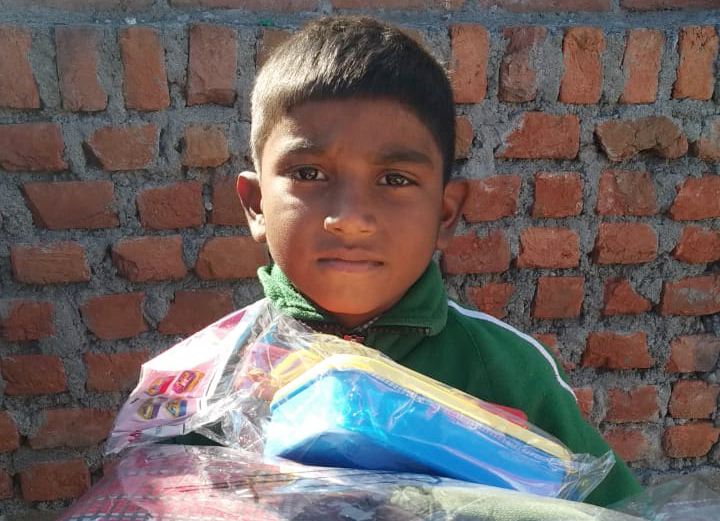
Aftab is a 7-year-old boy who is hard of hearing. His father is a daily worker and his mother is a homemaker in a village, and they worried that Aftab would not be able to go to school and communicate with others in society. Thankfully, he lives near one of EHA’s disability learning centers and was enrolled.
When he began attending, Aftab alternated between crying and running around inside the center. He did not know how to sit still and pay attention. EHA’s learning center staff helped him adjust by having one of his older sisters come in and sit with him. They worked on activities together. This helped him become calm and learn to be part of a group.
Now Aftab is able to sit in a group, learn, and play with other children, which is a great achievement for him. In the beginning, he was not able to communicate with others because of his hearing loss, but now he is learning to sign. This is opening up a whole new world for Aftab as he shares about himself and his family with others. The learning center staff celebrate the little milestones like seeing Aftab learn to sign his name and his family members’ names, helping him identify and write his letters, and watching the development of his interaction with other children.
EHA staff feel it is key to remember that each child is unique, and it is important to work together as teachers and families to help every child reach his or her potential.
A Restored Life
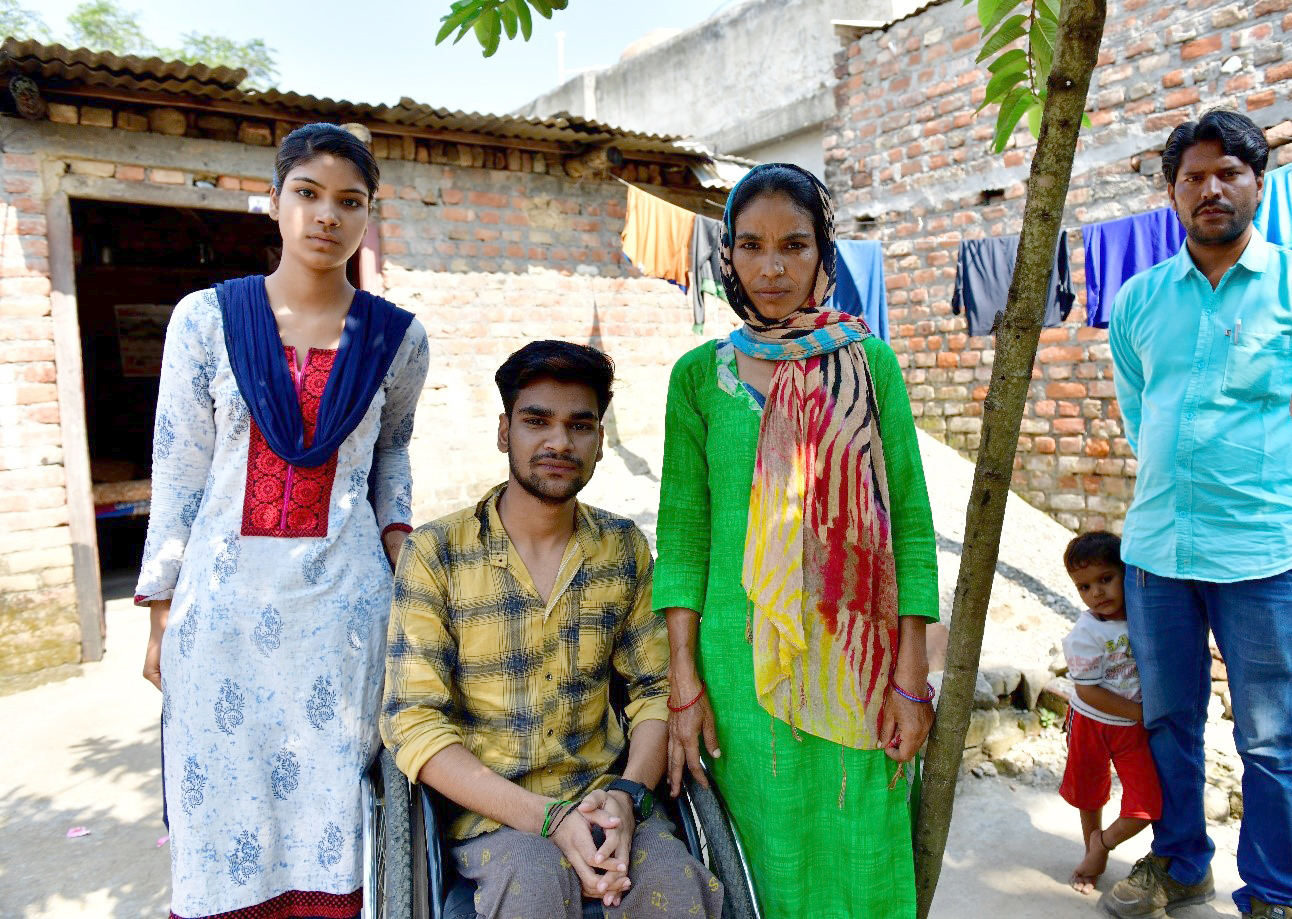
Ajab Singh’s world changed forever when he fell off a ladder while painting on the job. His spinal cord was damaged, and the 28-year-old spent the next year and a half lying at home with no rehabilitation. His wife and children had no idea how to care for him. Unable to support his family, Ajab sank into depression. Embarrassed by his lack of mobility and his urine bag, he did not want to see anyone outside the home. Ajab felt that no one could understand or relate to the problems he was facing. He lost all hope of a good future with his family.
Ajab’s father contacted the staff of EHA’s Anugrah disability ministry. They talked to Ajab, and he agreed to home-based rehabilitation. The staff were able to obtain a wheelchair for Ajab and they trained him in how to use it. After some time, Ajab had progressed so that he was strong enough to learn to walk with the help of a walker. Then he no longer had to depend so much on his family and began going out of his house. People from his church and neighborhood were glad to interact with him.
After many counseling sessions, Ajab realized that his life could only change if he accepted himself first. He was surprised to find acceptance from others as well. Ajab and his family were able to attend various therapy camps and family retreats held at the Anugrah Intervention Center. These events allowed Ajab to meet and share experiences with other people and families going through similar challenges in their own lives. His depression lifted.
Now Ajab has a small shop near his home, and he gets himself there to work each day. Being able to generate an income for his family has made all the difference to Ajab. He will be forever grateful to the Anugrah staff for all their work in helping him get his life back.
Desire and Determination Change a Girl’s Life
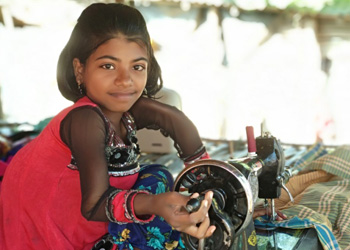
When Ronika Kumari was born, her parents were dismayed to learn that neither her hands nor her feet had been formed properly. Her father took out a loan from a village landowner for medical treatment in Patna, but he quickly went deeply into debt and her treatment could not be completed.
In spite of her challenges, Ronika did not give up on life. Her grandfather took care of her and encouraged her to stay in school, even helping to transport her back and forth every day. Supported by her family, Ronika decided to learn to make designs on cloth with a needle and thread.
One day when some Madhipura Christian Hospital project staff were visiting in her village, they heard about Ronika. When they visited her at her home, they were inspired by her willpower and determination. The project staff changed her life by deciding to give her a sewing machine to help with her livelihood. They also helped her to get training in sewing.
Now Ronika stitches cloth at her house, and she has begun getting orders from the people in her village. She is a wonderful example that for those who live with a physical disability, if there is desire and determination, change is always possible.
Wheelchair Distribution Improves Lives
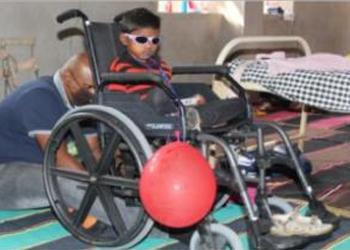
Disability is common in the Palamu and Latehar regions, with both disabled adults and children often neglected and considered a burden. The disability program at Nav Jivan Hospital works with people and their families to access rehabilitation services.
A significant time in Nav Jivan’s ministry came about when Joni and Friends and Wheels for the World came alongside them to hold a wheelchair distribution. The goal of the event was to share God’s hope along with the gift of mobility through assistive devices. It was designed to bring local churches, the hospital, and families together to reach out to these individuals, many of whom live in poverty, pain, and despair.
The actual distribution took place over five days and totaled 292 assessments. Each patient was individually evaluated, custom fitted with an assistive device such as a wheelchair or walker, and then trained in its use. Then, along with their families, they spoke to a counselor who listened to their troubles and then shared the story of Joni Eareckson Tada, the founder of Wheels for the World and a person with a disability herself.
This event was not just about providing mobility aids but also provided a unique opportunity for the hospital staff and local pastors to touch peoples’ lives and show them the love of God in a personal way.
Samvedna Dhana Disability Resource Center Opens
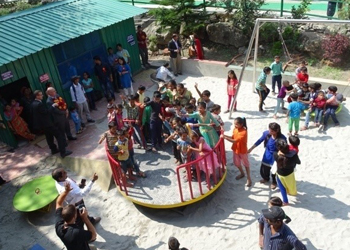
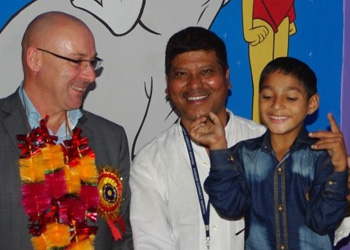
The Samvedna Project at EHA’s Landour Community Hospital has been serving the surrounding area’s disabled residents since 2015. A few short months ago, they had the honor of opening their very own Dhana Disability Resource Center, which will enable them to do even more for those in need.
This multi-purpose building is designed for programs that will bring independence to disabled people, from children through adults. Some services are health-related, such as medical and rehabilitation programs, and some focus on education and livelihood training.
The team is able to hold monthly check-ups and screening camps in different disability specialities, such as orthopedic, dental, and psychological. Referrals are then given for needed corrective surgery and other specialized care. The ASHA and Aggan Wadi workers keep an eye out for children with disabilities to aid in early identification and treatment.
Children who need physical therapy are able to make good use of this beautiful facility and its delightful playground. Every day at the center, physical, occupational, and speech therapists are available to work with the children one-on-one for best results.
Education is the primary concern for people with disabilities, and the training modules include both school subjects as well as household chores and other daily activities such as bathing, grooming, and dressing. Training is also given to parents and caregivers to help them in their roles.
Livelihood training is also given, including how to print on and decorate paper bags and handmade cards, which are then sold at shops to bring in income for the patients.
Everyone involved with this facility and the programs it supports is excited to see the changes it has brought about, both in the lives of the local people and in how the rest of the community sees differently-abled people and learns to treats them equally.
Nari Niketan Home Gets Help From HCH
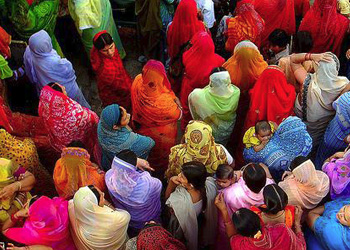
Nari Niketan is a government-run state home for destitute women. Most of the 100 residents struggle with a mental disability. In the past, it was not run well, and several years ago, government staff asked Herbertpur Christian Hospital to take over the operation. Now another agency is working with the government to rehabilitate the residents and move them into community-based homes that would each house four or five women. The agency asked for a non-governmental organization to take up the challenge; again, the government staff recommended Herbertpur. It is significant how highly regarded EHA staff are by the government officials.
In this same area, there are no homes for destitute men. A few years ago an injured man was found lying by the side of the road two kilometers away from Herbertpur. Dr. Daniel, then the managing director, personally went and brought him to the hospital. Though they do not have a facility to house people long-term, the hospital staff cared for the man for a year until he died. Recently they found another man wrapped in a quilt lying on the roadside. They brought him to the hospital, cleaned him up, and fed him. He cannot speak properly and is unable to remember anything but his name, Khogu. The hospital staff continue to try to rehabilitate him. Caring for these men who are rejected by society and even their own families shows the love of God in an extremely practical and significant way.
Individuals Impacted by Wheels of the World and EHA
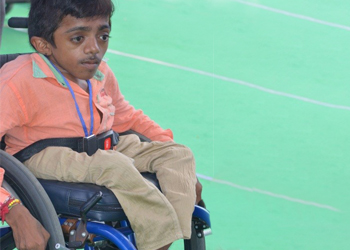
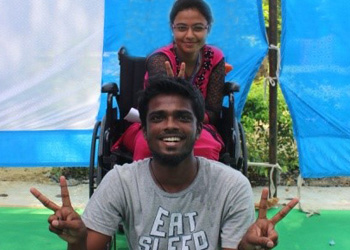
In the fall of 2016, EHA’s Broadwell Christian Hospital hosted a wheelchair distribution for Joni Eareckson Tada’s Wheels for the World organization.
A total of 204 custom-fitted wheelchairs, 20 walkers, 18 canes, and 28 pairs of crutches were given to disabled people who needed them. Each of these people’s lives were touched as they received training in the use of their appliance, and counseling that included sharing about Joni’s accident and ministry. Here are the stories of two of the elated beneficiaries.
One of the grateful recipients was Chottu from Adharpur. His mother said that she had never seen him happier than after receiving his wheelchair. He now uses it to go everywhere and insists on caring for it himself.
Neha from Kaandhivillage became a double amputee following an accident six years ago. Hopeless and disinterested in life, she immediately identified with Joni’s story and decided she too wanted to live an abundant life. She was thrilled to receive her custom-fit wheelchair.
Events like this allow EHA staff and partner ministry teams to show love in practical and encouraging ways to the disabled people around them. Lending a listening ear, the counselors give the patients a chance share about their pain and frustration. A number of the patients expressed amazement at the love that was showered upon them as team members spent an hour or more to customize the wheelchairs for their comfort.
Delivering Support Via Motorbike
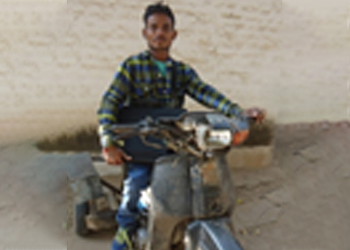
Stricken with polio as a child, Basant Ahirwar belongs to a lower caste and has not had a lot of formal education. Not one to sit around because of his disability, Basant learned mobile handset repair in a nearby village and supported himself by fixing electronics.
Meanwhile, Basant learned about Chhatarpur’s Community Based Rehabilitation (CBR) Project which was working among people with disabilities. He expressed a desire to join as a volunteer, working with the disabled in his own region. After learning about the rights of the disabled, he began traveling from village to village on his modified motor bike. He formed groups of people with disabilities, made them aware of the help available to them, and played a vital role in helping them access government facilities and programs.
Despite having to deal with his own mobility issues, Basant has made an enormous difference in the lives of many people struggling with all kinds of disabilities. So often the poor and illiterate just need an advocate to work between them and the government to help them access the care and services they have available to them. Going from village to village, Basant delivers the support they need via motorbike.
Showing Brotherly Love
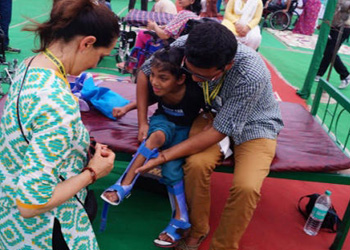
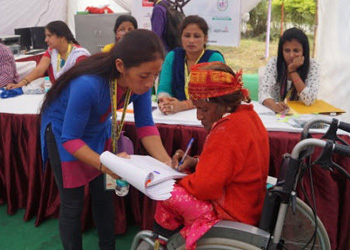
In the Wheels for the World program, run by Joni and Friends (JAF), wheelchairs are made available in different parts of the world, and a team of volunteers travels to assess, modify, and fit wheelchairs for people with disabilities. In October 2015, the first Wheels for the World program in North India took place. JAF worked with their Indian partner, Operation Equip India, the Community Health Global Network (Uttarakhand chapter), as well as the Engage Disability team with EHA members. Herbertpur Christian Hospital was chosen as the venue because it was near Dehradun, North India, was central to access, and had the appropriate facilities. Overall, 210 wheelchairs, 46 sets of crutches, 42 walkers, and 32 canes were distributed. The following article by Anneliese Petersen, a Wheaton College biology student interning at Landour Community Hospital, tells the story of this wheelchair distribution through fresh eyes.
“Let love be genuine. Abhor what is evil; hold fast to what is good. Love one another with brotherly affection. Outdo one another in showing honor. Do not be slothful in zeal, be fervent in spirit, serve the Lord. Rejoice in hope, be patient in affliction, be constant in prayer. Contribute to the needs of the saints and seek to show hospitality.” (Romans 12:9-13).
These past weeks I was struck by the idea of truly loving others. I think that we, working in a mission hospital, are certainly people who love. We recognize that the poor and marginalized need additional care and support, and we are eager to give it. But I find that, at least personally, I do so only to the point at which it is comfortable for me. I love others when it is easy, when it is uncomplicated, when it is fulfilling. But the Scriptures say to love genuinely. To love as a brother, to show great honor, to be fervent and not slothful.
A few weeks ago, there was a massive Wheel Chair Distribution (WCD) taking place at Herbertpur Christian Hospital. I had the joy of attending with a team from Landour Community Hospital to see the work that was being done. I was awed by the fullness of care that was being given, and found that the WCD model really was a reflection of this verse from Romans.
Patients with significant disabilities came from all over the region, each one having been sought out and assisted by a pastor in their community. This provided a local contact and support. The pastor represented someone from the patient’s community making a commitment to come alongside and love the patient, long term. More so than just neighborly kindness, they were showing brotherly love to the disabled in their villages.
Upon arrival, the patients were met personally by both a physical and an occupational therapist. These volunteers worked to understand the individual needs of the patient, and to prescribe the most adequate wheelchair for each situation. Mechanics and builders then discussed with the therapist and customized wheelchairs there on the spot. Many patients had come in on old, uncomfortable wheelchairs that had clearly been donated. Nothing could match the look of joy on their faces as they transitioned into new wheelchairs that comfortably matched their needs. Were the old wheelchairs bad? Certainly not. Sometimes we can only do so much, and a simple wheelchair is better than none at all. But these clean customized wheelchairs reminded me of the call to “Outdo one another in showing honor. Do not be slothful in zeal, be fervent in spirit, serve the Lord.” In just seeking to get by, in donating uncomfortable wheelchairs, we miss out on the opportunity to give others the best that is available. These new wheelchairs gave great honor to the patients, and reflected a deep, fervent, brotherly concern for the patients’ welfare.
I was reminded of how, in my own city of Chicago, I often get my leftover restaurant food packed to give to the homeless men on the street. Certainly, they are grateful. They need food. But how much more honoring would it be if I were to buy a cheaper meal for myself, and buy a second of the same for them? Thus, rather than giving away my leftovers, I would be able to give new, untouched, personal food. This is fervent love, in contrast to the slothful love of giving only what we don’t desire ourselves.
Finally, after being fitted with a new wheelchair, each patient met with a counselor, psychiatrist, or social worker. These individuals set out to rejoice in the hope of a new chair, be patient in the affliction of talking through each patient’s struggles and challenges, and be constant in prayer as each patient was told about God and his deep, unwavering, honoring love for them. And, of course, there was a huge meal served. What better way to show hospitality?
So I pray that we hold this image in our minds and hearts as we serve our neighbors. May we love genuinely, with brotherly affection, fervently honoring those around us. May we rejoice in the hope we find in the Lord, weep with the affictions of others, and, above all, constantly seek the Lord in prayer each and every day. For in Him alone do we find peace, strength, and joy for the journey ahead.
A New Lease on Life
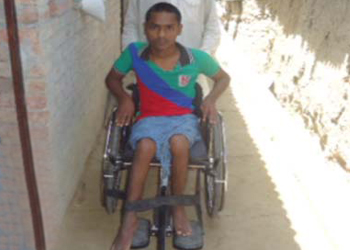
Disabled from childhood, sixteen-year-old Dharmendar Kuman fell and fractured both legs. His family had no money to take him to the hospital, so he went untreated. One day his parents visited a group, shared his story, and asked for help.
The next day a member of the group told Kachhwa Christian Hospital staff about his problem, and a Community Health Project team immediately went to his home and brought him to Kachhwa for treatment and x-rays. The doctor thought it best that he seek bone surgery at Robertsganj Hospital, so the CHP team took him the very next day for an operation, which was successful. Next they contacted the Delhi Center for Spinal Injury to acquire a tricycle wheelchair for Dharmendar. Now he is able to travel about on his own, and he has opened a small shop in front of his home to support himself.
Help for Disabled Children
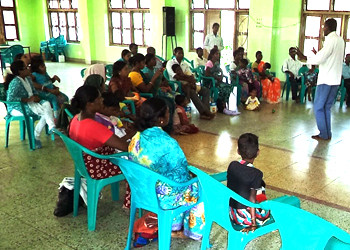
When attempting to reach out and help families with disabled children, EHA staff often find it difficult to connect with those in need. The issue can be a lack of interest on the part of the caregivers or simply the lack of a way to reach the right people.
The local church can help with both of these issues. In the Latehar district, the Catholic Church has been ministering to the people for a long time, providing spiritual counseling, education, and basic medical facilities. They have developed a good rapport with the local community they serve.
When Nav Jivan Hospital’s Community Based Rehabilitation Project wanted to hold a program for children with intellectual disabilities, the church stepped in to mobilize the community — and provided the location for the meeting. The turnout was beyond what anyone had expected — people were waiting outside the doors long before they opened. Seventeen young children were brought for screening, most of whom had some sort of developmental delay. The staff then provided information to parents on exercises they could do to help their child’s development and some tips on how to care for their child. They strove to help the parents understand the nature of the disability and what they could expect in terms of the child’s development.
In the end, it was encouraging to see that while the parents were sad about the condition their child struggled with, they had a smile on their faces when they left, knowing they had gained some tools to help and some hope for their child’s future.
Wheelchair and Education Opens Doors
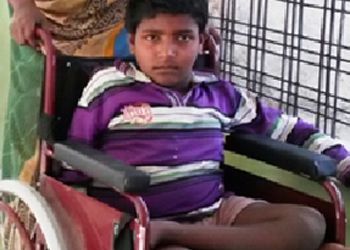
For the first 15 years of his life, Kumar Nath had no means to move from one place to another. He became paralyzed from the waist down due to medical negligence when he was injected with the wrong dose of medicine. Kumar’s parents tried all sorts of treatments, but each one failed. Eventually, Kumar was reduced to begging on the streets, but he had to share half of his take with whomever moved him from place to place. Meanwhile, his widowed mother struggled to provide for her seven children, one of whom is mentally disabled.
When Prem Sewa Hospital’s Mainstreaming Disability Project learned of Kumar’s predicament, they helped him apply for a government certificate which would provide him with a wheelchair. Kumar is thrilled with his new mobility within his village and beyond. At 16, he now has the opportunity to gain an education for the first time. Prem Sewa’s project began a non-formal education program, and Kumar was quick to join. His life-long dream of learning to read and write is finally coming true, thanks to EHA’s Disability Project staff. Kumar is now filled with hope for his future.
One Young Woman Experiences Life Turnaround
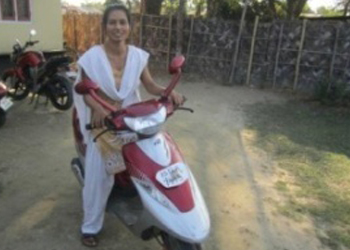
Aruna lost the lower part of her left leg in 2008 when she fell from a moving train. Though she longed to get an artificial limb, her family could not afford the treatment. Depressed and without hope, she came to BCH’s Community Based Rehabilitation Project. This program focuses on raising awareness about a variety of disabilities and provides advocacy for those who are disabled. They accepted Aruna, 22, into the program and began a series of surgeries on her stump. For the first time since the accident, her stump stopped oozing. She was then able to go to Guwahati and get an artificial limb.
Joining the project as a volunteer in 2010, Aruna was supported by the project team in every way, which helped her gain confidence. She now loves working with the children and believes that every child is special in the sight of God. The woman who once struggled with her disability is now helping others through their difficulties. Seeing her enthusiasm and strong relationships with the children who come to the center, the project team appointed Aruna as the Community Coordinator in 2012. She responded with happiness, increased confidence in her voice, and a constant smile that shows the hope she has. In her words, “I found God and I found hope in this project.”
A Disabled Child Receives New Life
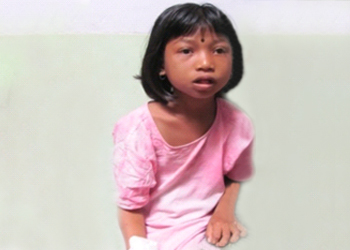
Eight-year-old Jupitora suffered from seizures and struggled with both walking and talking. It’s common in poor, rural areas in India for children with such special needs to be ignored.
Many of EHA’s hospitals have Community Health and Development Programs designed to address specific health issues. Baptist Christian Hospital in Tezpur is no exception. Their work includes a Community Based Rehabilitation (CBR) program for children with disabilities.
One success story involves little Jupitora. She had seizures as a toddler, had problems with speech delay, and didn’t walk until she was three. She was enrolled in the CBR program, and initially had many behavioral issues, including having trouble communicating and difficulty cooperating with therapies and activities. She was then brought to the hospital and diagnosed with cerebral palsy and a seizure disorder and was given medication for seizure control and a muscle relaxant.
Less than a year after beginning, a vast change was noticed in her behavior. Jupitora began participating in games, songs, dances, and other activities within the group. She also went through surgery to release her contractures and is progressing well. “I cannot thank God and the Community Health and Development program enough for giving my child a new life,” said her joyous mother.
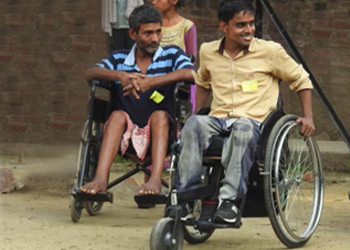
About Disability
In north India, adults and children with disabilities are often neglected and considered a burden to their families and to the community. They are rejected by society and sometimes even by their own families.
EHA works to help the disabled live fuller lives. For many, that simply means helping with mobility. EHA partners with Joni Eareckson Tada’s Wheels for the World to provide wheelchairs for many disabled people in India. And these are not just any old wheelchairs, but chairs custom-fitted to each individual who also receives time with occupational therapists. Others are given customized crutches, canes, or walkers.
Beyond just mobility, EHA also helps adults with disability learn how to find work so that they can provide a livelihood for themselves. They empower the differently-abled so they believe in themselves and find real change. So often, they just need an advocate to work between them and the government to help them access the care and services available to them.
